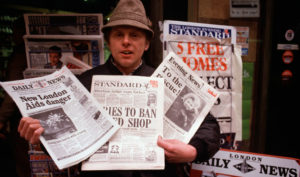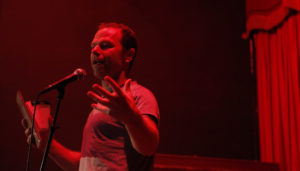The Yewtree investigations into historic sexual offences by public figures changed two things about the British relationship with celebrity. First, it made us more suspicious of it: the nice men in your living room had in several cases, it turned out, been abusing their familiarity in the most grotesque ways.
But as well as identifying several genuine perpetrators, the Yewtree overreached. In 2014, the police raided Cliff Richard’s home and the BBC was on hand to film it; no charges were brought and there is no suggestion of wrongdoing on Richard’s part. In 2018, the High Court ruled that the BBC coverage had infringed Richard’s privacy in a “serious” and “sensationalist” way.
Both Richard and Paul Gambaccini, another innocent who was arrested during Yewtree and released without charge, have argued that those accused of sexual offences should have anonymity to protect them from the stigma of the “sex offender” label. And in practice, the media has grown increasingly cautious about publishing suspects’ names, particularly famous ones.
Over the past few days, it has become obvious that this approach is as likely to inflame speculation as protect reputations. On Friday, The Sun reported that an unnamed “top BBC star” had been suspended over allegations that he had paid an unnamed 20-year-old “more than £35,000 since they were 17 in return for sordid images”, according to the unnamed 20-year-old’s unnamed mother.
The whole country became engaged in a high-stakes game of “Guess Who?”. There were so many candidates. Within 24 hours, one had been settled on in media gossip circles. Online, though, the guesses ran wild, with the words “nonce” and “paedo” freely dispensed. This was potentially career-ruining stuff: Rylan Clark, Gary Lineker and Nicky Campbell all issued statements denying being the presenter in question.
But if you knew, the name still seemed so unlikely. Huw Edwards. Beneath the stentorian furrowed brow that has carried the nation through election night and the Queen’s death, the naked absurdity of male lust.
And there were still twists. On Monday, the young person involved made a statement calling The Sun’s report “rubbish” (and saying that The Sun had been informed of this before publication). The BBC opened an investigation, then suspended it at the police’s request. On Tuesday, another person told the BBC they had received “abusive and menacing messages” from the accused, after they met on a dating app. A detail that attracted less attention was that the abuse happened after the alleged victim had hinted on social media that they would out the presenter.
Then the police concluded that there had been no criminal offence. And finally, on Wednesday, Edwards’s wife issued a statement confirming that it was him, and that “Huw is suffering from serious mental health issues”. “The events of the last few days have greatly worsened matters,” she said. “He has suffered another serious episode and is now receiving in-patient hospital care where he’ll stay for the foreseeable future.”
The mood deflated at this point. It felt a bit like having stayed at a gathering too long, queasily sobering up among the cold canapes and dregs of booze. The Sun has announced it had no plans to publish further allegations. The BBC will continue its investigation.
There is no nice way to be accused of being a predator. But the toxic mix of celebrity and anonymity seems to have made this exceptionally messy: the scurrilous chatter about Edwards expanded to fill the void of information. By the time he was officially named, the shaming had grown so extreme that he began to look like the victim — and yet we still don’t know what, if anything, he’s culpable of.
In one sense, the Edwards story is a very old-school tabloid expose. It’s in the lineage of sports anchor Frank Bough, who was brought down by the News of the World in 1988 with the headline “I TOOK DRUGS WITH CALL GIRLS”; or Jamie Theakston, who was reported by the Sunday People in 2002 to have visited a “vice club”. A good old-fashioned British sex scandal.
But although the British public loves those stories, it also harbours a conflicting instinct that celebs deserve some privacy — especially if it’s about sex. If Edwards was active on apps (he has yet to respond to the allegations), it says something that no one he communicated with went to the press until The Sun broke its story. Being a bit sleazy, on its own, isn’t deemed disgraceful behaviour.
But that doesn’t mean the British public has no taboos. There was much focus on the youth of the individual Edwards is alleged to have received pictures from. Age gap relationships, even legal ones, are broadly disapproved of. The Sun quoted the mother referring to “my child”, even though the individual is well into sexual majority — a technique to foil identification by not disclosing gender, maybe, but one that introduced an unsavoury implication.
The reports about Edwards also referred to his “power” as a celebrity. His greater fame, like his greater age, was assumed to confer a seniority he was able to exploit. This is true of some kinds of celebrity: the YouTuber who grooms his fans, the popstar who chews through groupies. But it’s also a logic that, at the peak of #MeToo, saw cases such as a bad date with the comic Aziz Ansari rounded up to practically assault.
It feels doubtful that presenting the 10 O’Clock News casts that kind of irresistible spell over young dating app users. Outside of the newsroom, it’s hard to imagine what power Edwards had to exercise. Conversely, anyone with compromising chats from an august national treasure has a one-click means of undoing them. The allegations against Edwards so far amount to unwise, but not illegal. There are certain things that are incompatible with broadcast gravitas, and it seems being incontinently thirsty online is one of them.
Edwards has suffered a humiliation that would be unsurvivable for many, personally as well as professionally. What he is accused of would appear to be a deep betrayal of his family; the way in which the accusations have been made has set him against his BBC colleagues, who at a minimum have seen their workplace brought into disrepute, and at worst have been dragged into the scandal on social media. And he has suffered in isolation, walled inside a formal namelessness that didn’t stop everyone from knowing it was him.
It is a strange fact that there are, out there in the world, actual paedophiles — men convicted of viewing the worst child sex abuse imagery — serving non-custodial sentences and living their lives. Meanwhile Edwards appears to have been comprehensively ruined by an allegation that so far amounts, at worst, to looking at pictures of someone he could have legally had sex with. This is not to say that his actions are beyond moral reproach. It’s possible to wrong other people without breaking the law.
It’s also possible to be both sinned against and sinning. But there is no proportionality in public shaming, and there is no privacy on the internet. Edwards was the perfect public figure for this scandal because everything about his image suggested perfectly controlled professionalism. How incongruous for the solemn man behind the desk to have appetites.
Those already committed to the “abuser” narrative will continue to believe the worst about Edwards; others will recalibrate him into a pure victim. The truth is probably messier. Whatever it is, it would have to be exceptionally bad to merit the destruction already inflicted. The problem is one of justice. Despite what Richard and Gambaccini believe, this is unlikely to be achieved in secret, any more than it is likely to be achieved by the febrile processes of social media.
Disclaimer
Some of the posts we share are controversial and we do not necessarily agree with them in the whole extend. Sometimes we agree with the content or part of it but we do not agree with the narration or language. Nevertheless we find them somehow interesting, valuable and/or informative or we share them, because we strongly believe in freedom of speech, free press and journalism. We strongly encourage you to have a critical approach to all the content, do your own research and analysis to build your own opinion.
We would be glad to have your feedback.
Source: UnHerd Read the original article here: https://unherd.com/



